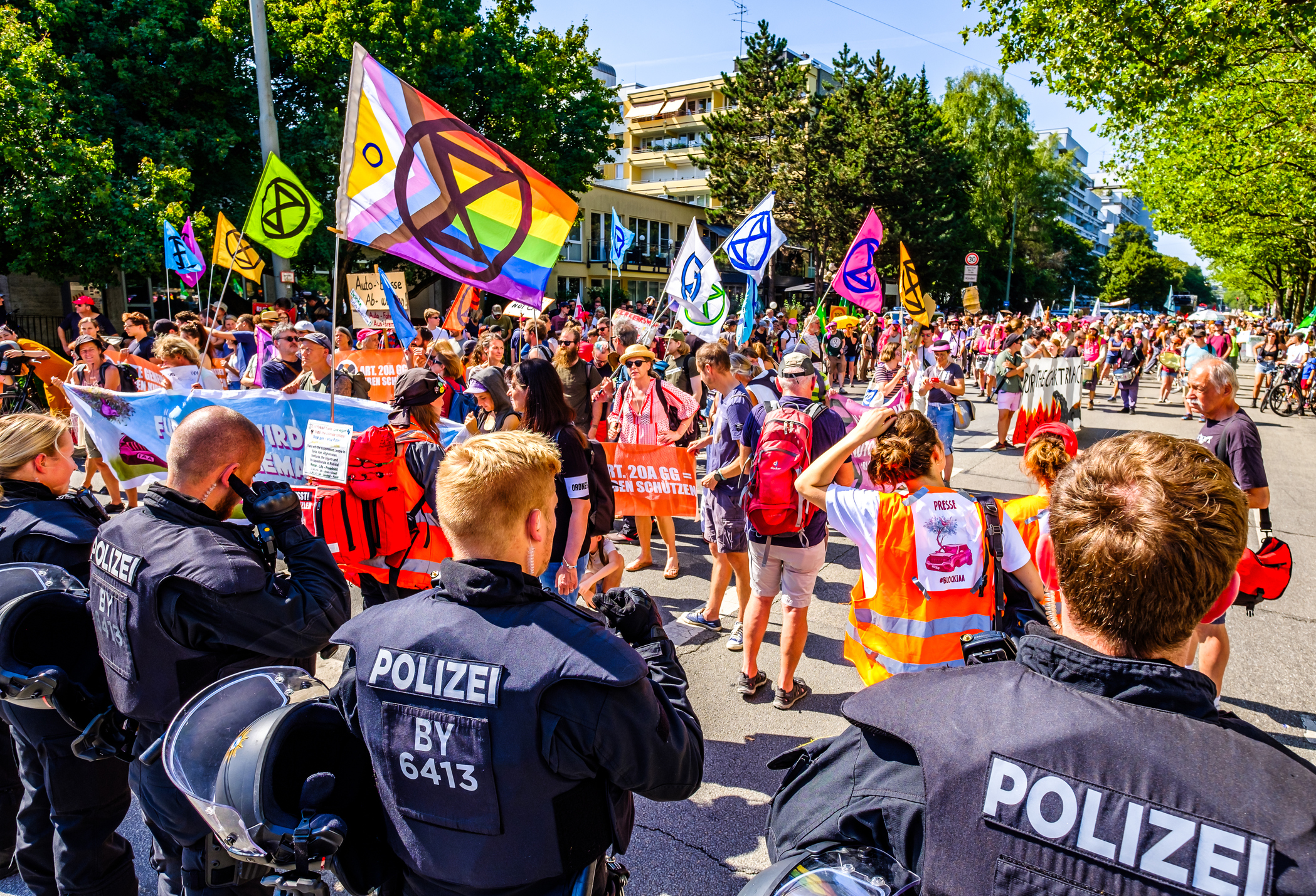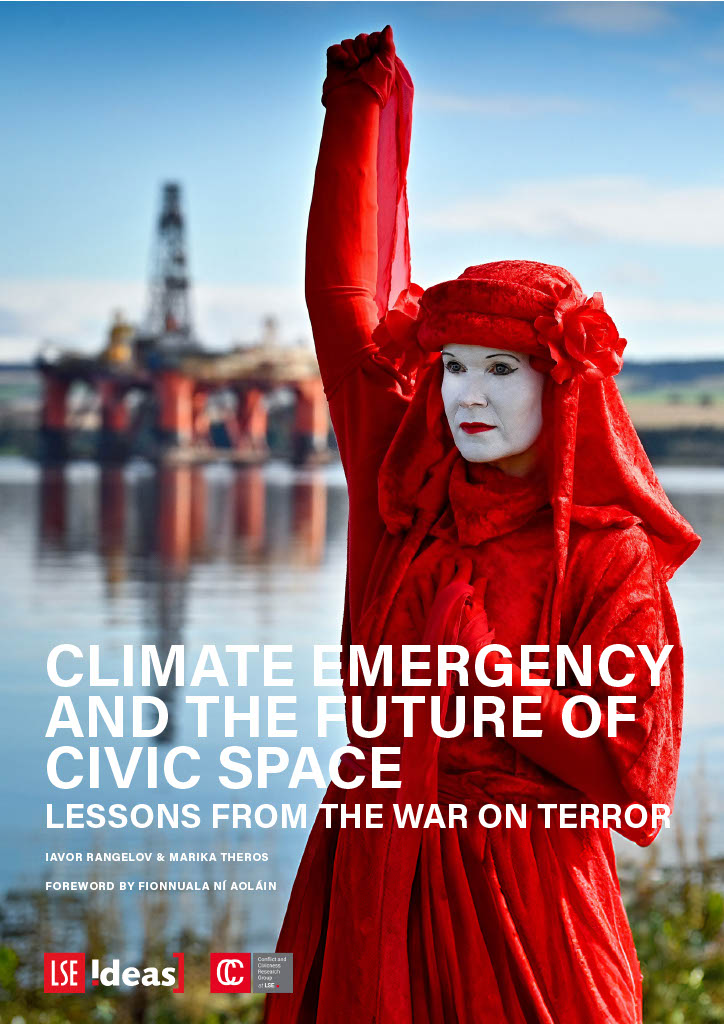Alarming new research from LSE IDEAS shows that state authorities are using counterterrorism-style tactics to clamp down on climate activism. Funders must respond to help keep civic space open.

For many years, my colleagues at the Funders Initiative for Civil Society (FICS) and I have repeatedly raised the alarm about the ongoing securitization of civic space.
Around the world, authoritarian and illiberal democratic governments alike are using a set of repressive strategies—what we call the “security playbook”—to stifle activism and limit fundamental freedoms to speech, assembly, and association. Nominally intended to safeguard national security, these mechanisms are instead being abused to crack down on rights activists.
Recently, colleagues at LSE IDEAS—the foreign policy think tank of the London School of Economics and Political Science—released an alarming report that shows how the security playbook is beginning to be employed to exploit the greatest shared challenge of our time: the climate crisis.
In “Climate Emergency and the Future of Civic Space: Lessons from the War on Terror,” researchers Iavor Rangelov and Marika Theros have carefully documented the growing securitization of environmental activism and climate justice. For any civic space watchers, their findings will be familiar. Regimes around the world are once again using the context of a legitimate emergency to consolidate their own power and stifle dissent.
When authorities criminalize activism by falsely framing it as a security threat, we all suffer from the effect it has on civic space.
Many of the tools and tactics in the security playbook—including invasive surveillance technologies, a wave of so-called “foreign agent laws,” and the misuse of national security measures—stem directly from the global war on terror. Similar techniques are now being used to securitize the climate space. Opaque climate financing flows especially mirror anti-terrorism financing mechanisms that can be used to attract both international investment and persecute civil society.
[READ: Defending Civic Space Against “Foreign Agent Laws”: How Should Donors Respond?]
Already, we are seeing this strategy bear out. In Vietnam, as Rangelov and Theros highlight, authorities relied on civil society expertise and input to win enormous sums of much-needed climate financing. But as soon as the ink dried on billions of dollars of public and private investment for Vietnam’s green transition, the authorities moved quickly to clamp down on civil society scrutiny and restrict their participation. A group of grassroots activists—dubbed the Vietnam Four—were prosecuted under vague tax evasion laws and sentenced to prison in a closed-door hearing.
“When authorities criminalize activism by falsely framing it as a security threat, we all suffer from the effect it has on civic space,” says Michel Forst, the UN special rapporteur on environmental defenders. “The recent securitization of climate activism follows the same twisted logic—and if we don’t stop it, it will have the same harmful impact on our access to human rights.”
Drawing on key lessons from the war on terror, Rangelov and Theros identify three likely pathways that will lead to the securitization of the climate crisis: prioritization, militarization, and authoritarianization. Their rigorous analysis outlines the logic of each pathway, the actors involved, and, most critically, the ways these risks can be averted.
Because, as Rangelov and Theros explain, it is not too late to stop the securitization of the climate crisis. As bad actors clamber to take advantage of the emergency, we still have a narrow window of opportunity to change the narrative about climate security.
The degradation of our planet is not, as authoritarians increasingly insist, a matter of national security.
FICS director Poonam Joshi, who funded this research, urged at a recent panel discussion that the climate crisis offers an opportunity to question the dominance of the hard security paradigm. The degradation of our planet is not, as authoritarians increasingly insist, a matter of national security. Rather, as Joshi explained, it is an existential threat to our shared human and environmental security—which therefore demands a collective, collaborative response that centers climate justice and environmental peacebuilding.
This approach is embedded in the Fund’s new climate justice strategy, which we shared publicly last year. In dozens of countries where we fund environmental activism, we’ve seen firsthand how grassroots activists can devise, deliver, and scale sustainable solutions to climate change. But the securitization of the climate crisis threatens to criminalize these essential contributions.
As funders and allies, we have two immediate priorities. The first is to support research, knowledge sharing, and collaboration, so that embattled environmental activists can prepare strategies to push back against the security playbook. By anticipating future trends and mitigating these risks, we can proactively fend off securitization of the climate space.
The second is to resource solutions led by grassroots activists. By realizing their visions for climate justice, we can provide viable alternatives to top-down climate action—protecting both civic space and our planet in the process.
Sign up to our newsletter
Add some impact to your inbox.
By submitting this form, you accept that your data will be stored and processed in line with our Privacy Policy.



